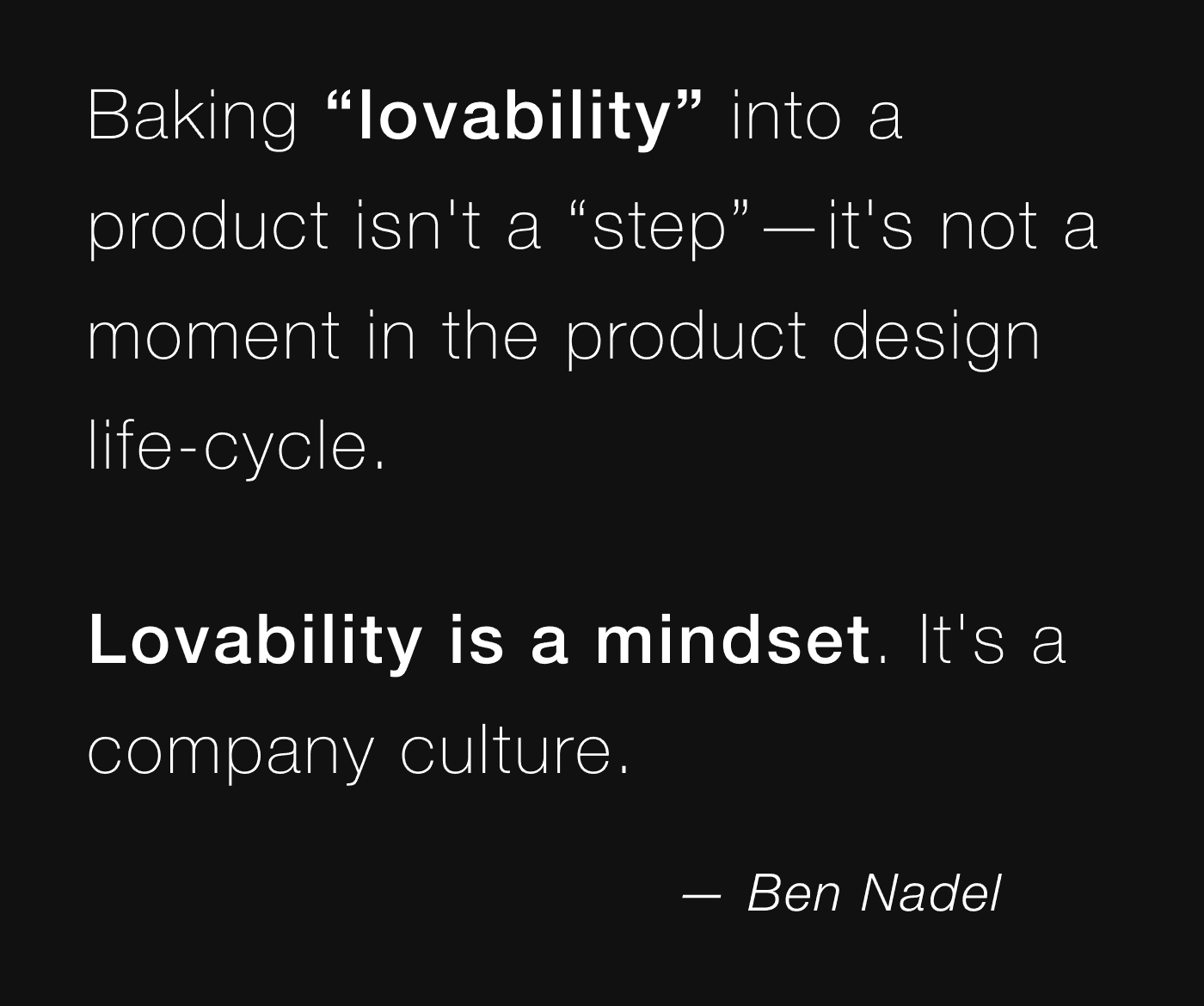Don't Let The Minimum Lovable Product (MLP) Become The Enemy Of The Good
As someone who has spent more than a decade living and breathing a "design first" product development workflow, the original concept of the "Minimum Lovable Product" was such a breath of fresh air. In my mind, the Minimum Lovable Product - or MLP - was nothing more than an acknowledgment that design was important! That a product wasn't just a collection of features but, rather, an experience that could thrill and delight the user. Over time, however, I've seen design teams begin to conflate the concepts of "lovable" and "perfect." This confusion doesn't create better products - it merely prevents new features from being shipped.
| |
|
|
||
| |
 |
|
||
| |
|
|
Baking "lovability" into a product isn't a "step" - it's not a moment in the product design life-cycle. Lovability is a mindset. It's a company culture. It's a unifying thread that's woven into all aspects of the product, from its design to its software and platform architectures and down through its support system. Lovability is a byproduct of love, not of features.
In fact, users probably won't even like the features you release. At least, not at first. And that's kind of the point: features get better the more they get used because that's when you can finally iterate. It's only after a feature is put in front of a user that you can get true feedback about what's working and what's not.
If you believe that a given feature is what makes or breaks a Minimum Lovable Product (MLP), then I believe you're applying love at the wrong layer. Love is not the size of the aggregate - it's the quality of the components. Love should be imbued in all of the features.
To paraphrase Michael Scott, who was, himself, quoting Wayne Gretzky, "Users won't love 100% of the features you never release." Release small features. Release them often. Release them with love. Then iterate.

Reader Comments
I first heard about MLP from Aha in May 2013.
https://blog.aha.io/the-minimum-lovable-product/
I blogged about it a few months later.
http://commadot.com/the-minimum-lovable-product-mlp/
Great concept, but most people don't get it. They think it means graphic design. People don't get Emotional Design (in the Don Norman sense).
@Glen,
I think the thing that gets me most about the MLP is that it's become a "card" that designers can play to prevent features from being released in anything less than the originally formulated idea.
ME: I'd like to release this part of the feature, then release this other part later.
DESIGNER: Sorry, the product has to be lovable.
ME: But, I think this feature would add value now. Let's have people start using it while we finish the rest of the code.
DESIGNER: Sorry, the product has to be lovable.
ME: (Channeling my inner Inigo Montoya): You keep using this word -- I do notta think it means what you think it means.
Ask them to define lovable in measurable terms. Also, ask them to read the original blog posts on the subject. Lastly read Emotional Design.
In other words, try to make lovable a concrete thing. Be the subject matter expert in lovability. Teach them.
And just for good measure, try to debate their side of the issue with someone. There is downside in releasing features that are half baked. Practice empathy. Take the high road.
Sorry, one more. They are forgetting the word Minimum. It's a crucial word. It means the LEAST amount of functionality that is still something users will love. Tiny features can be loved. Tell them, "this small feature is the minimum scope, let's make that feature lovable and ship it."
@Glen,
That is a great point, remembering the "minimum" part of the MLP! I think that definitely goes out the window a lot of the time.
Unfortunately, at this time, "Take the high road" for me is generally just "backing down". This is actually something I was just talking about with our "Tsar of Happiness" at work:
... it's a "known bug" that I'm working through :D
https://www.youtube.com/watch?v=nbZEkFLXh9Y
You are the co-founder. You have a responsibility to nut up.
This is helpful: http://commadot.com/the-care-pie/
Every employee (including you) has a responsibility to pick 10% of the decisions they are involved with and "use their chips" - to say they care about this and won't back down.
We believe in you Ben! :)
@Glen,
Ha ha, that's great. But, the post is well taken. In my mind, I know what that 10% is -- I just need to not back down so often.